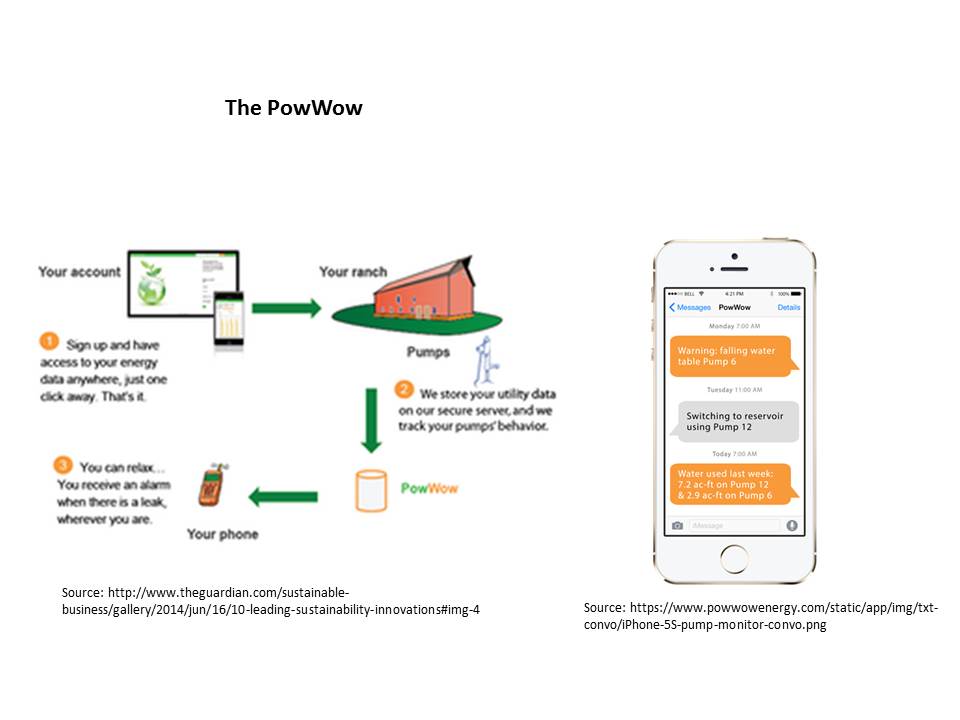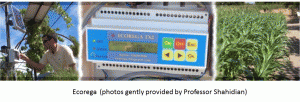The evolution of technology and environmental destruction are two very current topics. Environmental destruction is certainly a very important topic these days, as the ecosystem is increasingly being depleted. Regarding the evolution of technology, many say it has affected us negatively. So how can you join these two negative aspects and make them foster something positive and capable of innovation in the world of sustainability?
Olivier Jerphagnon, Jim Klingshirn and Stanley Knutson, the founders of PowWow Energy thought about it and created an innovative app for the sector of agriculture in 2013.
But first let’s get to bottom line.
Increasingly, due to several factors, the use of water in agriculture is higher, and globally, the agricultural sector consumes about 70% of the planet accessible freshwater. In Europe, a third of water consumption is spent in this sector.
It was in this context that the PowWow founders developed the project that has already made them earn many millions – an application for farmers that tracks water pumps, detecting abnormal performance, minimizing water leaks and repairing costs. By signing up in the site, you access the data whenever you want. It tracks the water pumps and, when their behaviour is not normal, a text message is sent directly to the farmer, explaining what is going on, what needs to be changed, or simply an update about the pumps.

Also in Portugal similar top innovations have been developed!
The University of Évora created a water controller which measures the exact amount of water required for irrigation of a plant based on their evapotranspiration, and then apply exactly that amount of water to the crop, therefore avoiding unnecessary wastes.
As Professor Shakib Shahidian, who led this research, told us “Ecorega can irrigate six different irrigation sectors, since different crops have different irrigation needs. The system also has the capacity to carry out fertilization and operate the pump, whenever necessary.”
This technology developed by the Department of Rural Engineering of the University of Évora aims to replace the traditional programmer of irrigation systems, which are associated with high water losses, and hence adjust the amount of water needed for irrigation based on the temperature, time of year , solar radiation, place characteristics and type of flora.

Ecorega irrigation device
This product, which can be seen in the picture above, has been successfully used in vegetables, lawns and corn, providing a very simple and efficient way of implementing a smart irrigation system.
Professor Shahidian, who has worked in this concept since 1995, explained that mounting such a system is even cheaper than mounting a conventional irrigation system, and “there is now an agreement with a national company, ProTerra, which will produce a new model completely manufactured in Portugal. We are currently finalizing the equipment in order to be presented to some local authorities. The product was already used in the green spaces surrounding Silves Castle. Now the Ecorega is ready for large gardens as well as golf courses.”
Although not using the Ecorega, the Belas Clube de Campo exceeded the expectations and is among the top 10 world golf courses based on their environmental merits and on the solutions assumed to reduce water consumption.
The Belas Courses use a set of grass species selected carefully to reduce water consumption. Flow meter, just outside the pump station, controls the water for irrigation. During Summer, when the field is more watered, besides the night irrigation, it is sometimes necessary to water certain areas during the day. These watering are manual using hoses. Some extra water partly rolls over into the existing lakes along the field being reused. Moreover the sprinkler system controls, efficiently, the quality and the quantity of the water used. Quantifying times / hours the field is watered is difficult, but, on average, only in the warmer months in summer is it watered, and so it is perfectly adapted to hold up the typical region weather: the cold wet winters and the hot windy summers.
Furthermore, regarding sustainability, other aspects must be pointed out: grass and other wastes are reused; biodiversity is protected. “I’m here for about one year and a half, but I can tell you that the field has a very extensive area of animal shelters. We also have wooden houses for birds to nest throughout the courses. “, said Lourenço Vaz Pinto, the Greenkeeper of the field, ”There are certain overgrown areas along the field that are not touched, precisely to interfere as little as possible with nature.

Photo gently provided by the greenkeeper
The existing lakes are like a home for many birds that pass here. As permanent “customers”, we have ducks and coots. Rabbits, partridges are seen daily too”, he added.
Moreover, the greenkeeper is using more and more green products, and doing some tests on biological products to apply them in the grass. Waste management is also done in a very organized way, since the club counts with several containers to enable a correct selection of iron, wood, paper, oils, plastics, etc. Twice a year a certified company collects these containers of recyclable materials. The Club also counts with photovoltaic panels that are power generators enabling selling power to the grid (EDP), with considerable income.
This golf course was the first residential development to obtain the Sustainable Building Certificate and, internationally, it was distinguished by the organization of National Geographic as one of the best in the world in terms of environmental protection and water management. It is recognized for its work in terms of sustainability, emphasizing the excellent environmental performance, reasons that make this venture a unique creative project and a reference.

Belas Clube de Campo general view (Photo provided by the greenkeeper)
Actually, creativity isn’t just a superfluous “add-on” quality… Paraphrasing Steve Jobs, creativity is just connecting things!
Creativity, technological innovations and high responsible management – expressed in the examples above – raise hope for a more sustainable future and… prove that Portugal is also up to the highest expectations!




You must be logged in to post a comment.